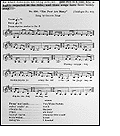Frances Densmore becomes Ptesan 'non 'pawin:
Two White Buffalo Woman
 WHEN DENSMORE WAS STUDYING the Sun Dance on the Lakota Standing Rock Reservation, an elder named Red Fox announced to an assembly of leaders that he would adopt her as his daughter. According to Densmore, this "very prominent chief" had a daughter of the same name who had died years before.
WHEN DENSMORE WAS STUDYING the Sun Dance on the Lakota Standing Rock Reservation, an elder named Red Fox announced to an assembly of leaders that he would adopt her as his daughter. According to Densmore, this "very prominent chief" had a daughter of the same name who had died years before.
The next year, Densmore said, "a thousand Indians" collected at Grand River, SD, for Fourth of July celebrations. The event included ratification of her adoption into the Hunkpapa Lakota band.1
Ever the ethnologist, Densmore recorded and studied the honor songs that Red Fox commissioned for her. She published them in her massive study of the Teton Sioux without mentioning that the songs were for her. Densmore's text reads:
Songs in Honor of an Individual
The following group of 123 songs illustrates the Sioux custom of introducing a new name in a praise song which has been used for other persons, and also of composing new words for songs…
The person whose name appears in the songs is Two White Buffalo, whom Red Fox adopted in place of his deceased daughter and to whom he gave his daughter's name. Red Fox stated that he had a right to give this name as he had killed two white buffalo. Whenever these songs are sung it is expected that Red Fox will make, in behalf of Two White Buffalo, a gift to the singers or to any project for which donations are being solicited. Red Fox is a man who is highly respected in the tribe, and these songs have been widely sung.
|

|
LISTEN
The Poor are Many (RealAudio 2.0 14.4 kbps)
This is the honor song composed to honor Densmore on her adoption by Red Fox. It is sung by Shoots First and recorded by Densmore. Several Lakota were present at this recording session. The song starts with a spoken introduction and ends with spirited whoops.
SOURCE: Library of Congress Archive of Folk Culture cylinder #10,557:B2
Song Glossary
Petsan' -non pawin - Two White Buffalo
wakta' yanka' yo - watch
o'hunke sni - the poor
o'taye - are many
heya' pi can'na - whenever this is said
sunka' wakan - horses
wecun' we - I donated
|
Red Fox Misses His Adopted Daughter
Typed copy of message of Red Fox to Frances Densmore.3
Densmore stayed in touch with Red Fox after she left the Dakotas. In 1917 he implored his daughter to visit, saying he was ill from not seeing her.
Introductory Note By Densmore:
This message, contained in a letter from a friend, was transmitted July 2, 1917. This friend had seen and encouraged my work among the Chippewa and knew of my work among the Sioux. On a business trip in Dakota he met many Indians whom I had known, among them being Robert Higheagle who had acted as my interpreter. My adoption by Red Fox took place in 1911 and is mentioned, without my name, in Bulletin 61, p. 498 ff. It is described in a simple narrative written for children, submitted with ''miscellaneous papers."4
Red Fox's Message to Densmore
I wish to see my daughter again some time, this all at our Fair if possible. I've not seen her and I'm sad. It seems I'm sick by not seeing her. In all this District the people are anxious to see her too; and her mother has some collection of beadwork and a tipi ornamented with painting; when she comes she shall have them.
I received a cross and a rosary from her which were consecrated by the priest; we are still keeping them, they are the best we have. It has been our custom in the past to honor our beloved ones, so that we usually give away feather hats to the poor.
I also gave her 2 horses; and I drove them up to sell them; they are at my camp for her. I won't send her the money; she (my wife) wants me to sell them, but I want to keep them for her till she comes.
I want to give her this pipe and tobacco pouch; I am keeping them for her, which she can give to the President.
If she is coming she can notify Crow Ghost, who is my nephew; and he is her cousin; so he can take her down to my place.
That is all.
Densmore's Postscript:
In explanation of the foregoing it may be said that an Indian does not distinguish between the words "given" and dedicated. Thus a horse or other object is considered the property of a person to fathom it has been "given" though it remains in the possession of the donor. The recipient has a right to claim it at any time.
--Frances Densmore
NOTES
1. "Memorandum to Charles Hofmann 1943..." in Frances Densmore and American Indian Music, Charles Hofmann ed. (New York: Museum of the American Indian, 1968) 33.
2. Shoots First, The Poor are Many, Densmore Cylinder Collection, Library of Congress Archive of Folk Music, 10,577:B2.
3. LOC box 18.
4. Bulletin 61 is available as Teton Sioux Music and Culture, Lincoln, NE, University of Nebraska Press, 1992.
Song Catcher
|


